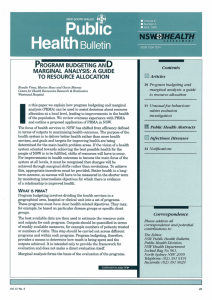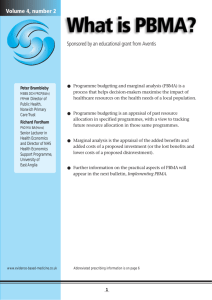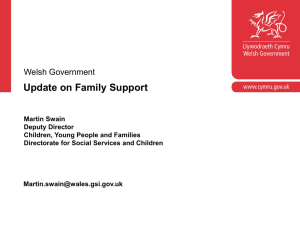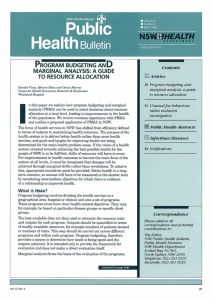A National Programme Budgeting and Marginal Analysis (PBMA)
advertisement
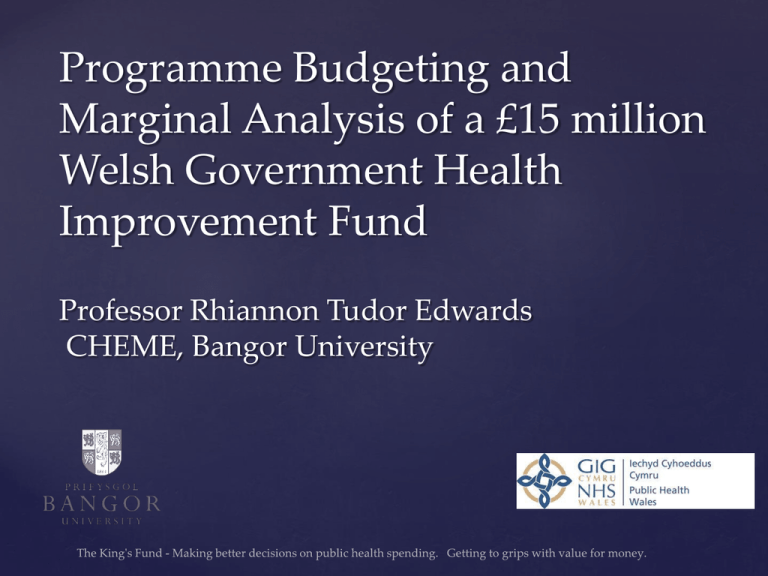
Programme Budgeting and Marginal Analysis of a £15 million Welsh Government Health Improvement Fund Professor Rhiannon Tudor Edwards CHEME, Bangor University PBMA – The Team A National Programme Budgeting and Marginal Analysis (PBMA) of Health Improvement Spending Across Wales: Disinvestment and Reinvestment Across the Life Course. The Team: Rhiannon Tudor Edwards, Joanna M Charles, Sara Thomas, Julie Bishop, David Cohen, Sam Groves, Ciaran Humphreys, Helen Howson, Peter Bradley (on behalf of the Public Health Wales Health Improvement PBMA team) Professor Sir Michael Marmot on Desert Island Discs “ Medicine is failed prevention.” and….. “If Economists come up with any proposals that harm children, then those Economists must rethink what they are doing.” Desert Island Discs Broadcast: Sunday 06 July 2014 Professor of Epidemiology and Public Health Public Health Challenges in Wales Some of worst life expectancies in the UK (19 year differential between best and worst) Smoking causes about 1 in 5 deaths – prevalence currently 23% -highest in young Males aged 25-34 at 38%. About 45% of the population drink above guideline amounts of alcohol. Over 1,000 people a year die from alcohol in Wales. Over 55,000 hospital admissions in Wales are due to alcohol. Under a third of adults meet physical activity guidelines – with over 30% of adults taking no exercise in a week. 57% of the Welsh adult population is overweight or obese. Definition of PBMA PBMA is a process that helps decision-makers maximise the impact of public health resources on the health needs of a local population. ● Programme budgeting - an appraisal of current resource allocation in specified programmes. ● Marginal analysis - the appraisal of the added benefits and added costs of a proposed investment (or the lost benefits and lower costs of a proposed disinvestment). (adapted from Brambleby and Fordham 2003) PBMA Stages (Brambleby and Fordham, 2003) 1. Choose a set of meaningful programmes 2. Identify current activity and expenditure in those programmes 3. Think of improvements 4. Weigh up incremental costs and incremental benefits and prioritise a list 5. Consult widely 6. Decide on changes 7. Effect the changes 8. Evaluate progress HIP PBMA Process Results of Investment and Disinvestment Decisions Recommendations of PBMA group Total disinvestment in 7 out of 25 initiatives at a total cost of £1.5 million. (The Cooking Bus, Smoke Bugs, Skin Cancer Awareness, Health Challenge Wales Website, Mind, Exercise, Nutrition… Do it! (MEND), Mental Health First Aid and Smokers Helpline) Partial disinvestment in a further 3 interventions at a total cost of £7.3 million. (Designed to Smile, The National Exercise Referral Scheme and Smoking Resources) The panel did not recommend increasing investment in any of the 25 initiatives. HIP PBMA Process continued The Media Fallout Government pressure to show the returns on investment to the NHS of investing in health improvement – very difficult in the short term. Response to Media Fallout Dr Patricia Riordan, director of health and healthcare improvement for PHW, said "I think it's a concern when you are made aware through the evidence that your resources have not been targeted appropriately and this is what I say - we need now to refocus those resources to programmes that we know deliver the outcomes" "What we are doing today in Public Health Wales is acknowledging that we need to do things differently now” "It is no longer acceptable to do things the way we did them in the past - we need now to look forward to a whole transformational change” Back to Theory Allocative Efficiency – what should society do to improve society’s health and well-being? * Improve child health and education Technical Efficiency – what technical method should be employed to achieve allocative efficiency goals? What is the most cost-effective way of improving child nutrition in a school setting? E.G. In England - As of September 2014 all state-funded schools in England, including academies and free schools, will have a legal duty to offer free meals for all 4 to 7 year olds under the Universal Infant Free School Meals policy. In Wales Free Healthy School Breakfasts for all primary school children of all ages in maintained schools. What I think about all this today… Start with an allocative efficiency goal, e.g., we need to improve child nutrition and education Find out all Government spending across all departments to get a complete picture Review the evidence of effectiveness and cost-effectiveness – this is the technical efficiency question Anticipate media fall out and have a good news story ready (we are disinvesting in X to reinvest in Y) Monitor uptake of public health programmes, potential barriers to uptake (equity concern) and link with routine data collection systems (Government, schools, primary care) Publish findings to add to the emerging evidence base Thank you Diolch yn Fawr Ebost/E-mail: r.t.edwards@bangor.ac.uk Twitter: @ProfRTEdwards



